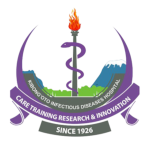
THE UNITED REPUBLIC OF TANZANIA
MINISTRY OF HEALTH
KIBONG'OTO INFECTIOUS DISEASES HOSPITAL



The research activities at Kibong’oto Infectious Diseases Hospital go way back to the colonial period when extensive research was being conducted on Tuberculosis. This established Kibong’oto as a hallmark and icon for research undertakings, contributing to the discovery of anti-TB drugs for combating and treating TB as a pandemic. A notable researcher who spearheaded the research during that time was Robert Koch.
Following independence in 1961, the hospital continued to receive numerous research projects aimed at informing and influencing paradigms in the management of infectious diseases and reshaping policy responses to emerging and re-emerging diseases. With capacity building among employees across varied cadres, the hospital has become a hub of research both nationally and internationally, particularly since the first Kibong’oto researchers were rooted in research implementations in 2015.
Currently, the hospital is a powerhouse in producing young researchers and has laid down a blueprint for tackling multidrug-resistant tuberculosis, tuberculosis, HIV, and other infectious diseases, aligning with the 2035 End TB strategy. To achieve the objectives of the Directorate, deliberate efforts have been made in grant proposal writing for infectious disease interventions to ensure adequate resources for research undertakings. Dissemination of research findings through local and international outlets has also been prioritized, ensuring that results reach relevant bodies such as the World Health Organization. The Directorate further produces manuscripts for approval and publication in various platforms, including websites.
To authenticate publications, clinical trials (all phases) have been conducted at Kibong’oto Hospital since 2015, with some involving multi-site randomization. The Directorate also plans and coordinates the initiation of research study protocols, while expanding established research capacity to provide solutions for re-emerging infectious diseases.
Training, both short-term and long-term, has been a cornerstone in producing competent experts. Long-term training opportunities include Master of Science, Ph.D., and Postdoctoral levels, accessed locally and internationally, with a strong focus on mentoring the next generation of scientific leaders in infectious disease research.
Due to the vast knowledge garnered in infectious diseases, the Directorate has also been offering consultancy services to other health institutions and experts handling patients with complications, such as extensively drug-resistant tuberculosis.
